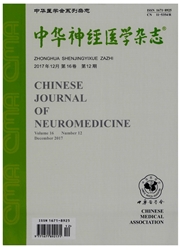

 中文摘要:
中文摘要:
目的研究脑内葡萄糖代谢改变对小鼠学习记忆的影响及其在AD发病机制中的作用。方法小鼠按随机数字表法分为四氧嘧啶低剂量组(剂量1.5mg/kg)、四氧嘧啶高剂量组(剂量4mg/kg)和对照组(注射等量0.9%生理盐水),每组7只,前2组小鼠脑室内注射0位Ⅳ_乙酰葡萄糖胺(0.GIcNAc)转移酶的抑制剂四氧嘧啶,干预脑内葡萄糖代谢。Morris水迷宫实验检测小鼠学习和记忆能力,Western blotting蛋白免疫印迹和免疫组织化学染色分析小鼠脑组织细胞骨架蛋白神经丝的糖基化和磷酸化改变。结果定位航行实验:四氧嘧啶脑室内注射小鼠平均逃避潜伏期和路径长度较对照组明显增加,差异有统计学意义(P〈0.05);空间探索实验:四氧嘧啶脑室内注射小鼠穿越隐匿平台次数较对照组明显减少,初始角度(小鼠入水时游向和入水点跟平台连线的夹角)明显增加,差异均有统计学意义(P〈0.05)。与对照组比较,四氧嘧啶脑室内注射小鼠神经丝蛋白的磷酸化表达明显增加,相应分子量蛋白的糖基化表达明显减少,差异均有统计学意义(P〈0.05)。与对照脑组织比较,AD脑皮质神经丝的磷酸化表达增加而糖基化表达减少,差异有统计学意义(P〈0.05)。结论四氧嘧啶脑室内注射导致小鼠学习记忆能力的减退,其可能和脑内糖代谢改变影响细胞骨架的糖基化和磷酸化有关,并与AD脑内神经丝的糖基化和磷酸化改变相似。
 英文摘要:
英文摘要:
Objective To investigate the effect of glucose metabolism alteration induced by alloxan intraventricular injection on learning and memory abilities of mice, and its role in the development of AD. Methods Mice were randomly divided into high-dose alloxan intraventricular injection group (n=7, 4 mg/kg) and low-dose alloxan inlraventricular injection group (n=7, 1.5 mg/kg) and control group (n=7, physiological saline); intraventricular injection of aUoxan, the O-GLcNAc traasferase inhibitor, was performed in the high-dose and low-dose alloxan intraventricular injection groups to interfere the brain glucose metabolism. Morris water maze was used to detect the learning and memory abilities of mice. Western blotting and immunohistochemistry were used to analyze the alterations of phosphorylation and O-Glycosylation of neurofilament in mice brain induced by alloxan intraventricular injection. Results In the located navigation tests, the swimming time and distance to find the platform in the mice of alloxan administration were significantly increased as compared with those in the control group (P〈 0.05); in space exploration experiments, compared with those in the control mice, the number of crossing the hidden platform was decreased and the initial angle of entry to water was increased in the mice of alloxan administration (P〈0.05). Western blotting and immunohistochemistry displayed that phosphorylation was obviously increased and the O-Glycosylation was significantly reduced in the cytoskletal neurofilament of the mice with alloxan administration ascompared with those in the control group (P〈0.05), which was similar to the alteration of neurofilament's modification in AD brain. Conclusion The inventricular injection of alloxan could impair the learning and memory of mice, which might have a relation with the dysregulation of phosphorylation and O-Glycosylation in neurofilament caused by the impaired glucose metabolism, which is similar to the alteration of phosphorylation and O-Glycosyl
 同期刊论文项目
同期刊论文项目
 同项目期刊论文
同项目期刊论文
 期刊信息
期刊信息
